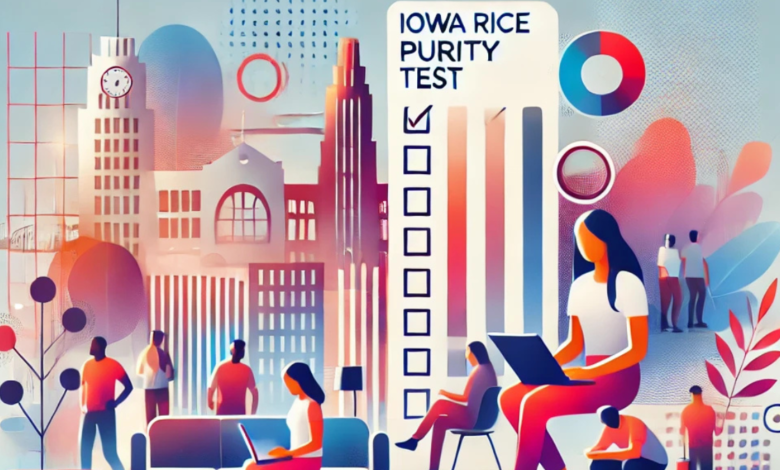Iowa Rice Purity Test: Understanding Its Popularity and Insights

What is the Iowa Rice Purity Test?
The Iowa Rice Purity Test is a unique phenomenon that has gained traction among young adults and internet communities. Rooted in curiosity, humor, and introspection, the test is not just a questionnaire but a social and cultural statement. In this article, we will explore the origins, significance, and implications of the Iowa Rice Purity Test, breaking down its facets into digestible sections.
A Brief Introduction
The Iowa Rice Purity Test is a self-assessment survey designed to evaluate an individual’s “purity” based on life experiences. With questions ranging from harmless fun to deeply personal topics, it provides participants with a numerical score that indicates their level of innocence or exposure to various activities.
Origins and History
Originally designed as a lighthearted tool for college students to bond and compare life experiences, the test traces its roots to Rice University, from which it derived part of its name. Over time, the test expanded beyond its original context, gaining a following on social media and in online communities. The inclusion of “Iowa” in its name is often speculated to signify a midwestern touch, though its exact origins remain ambiguous.
How It Works
The test comprises a list of 100 questions, each detailing an experience or behavior. Participants check off the experiences they’ve had, and their purity score decreases with each checked box. Scores range from 0 (least pure) to 100 (most pure), with lower scores often indicating a more “experienced” or adventurous lifestyle.
Why Has the Iowa Rice Purity Test Become So Popular?
One reason for the test’s widespread popularity is its ability to encourage self-reflection. By answering the questions, participants are prompted to revisit their past experiences, consider their values, and assess their personal growth. This introspection is both fun and meaningful, offering a chance for participants to better understand themselves.
A Tool for Social Connection
The Iowa Rice Purity Test is often shared among friends, classmates, or even strangers in online communities. Comparing scores fosters conversations about shared experiences, societal norms, and the diversity of human behavior. This communal aspect makes it particularly appealing to younger audiences looking to connect with peers.
The Role of Humor and Curiosity
Many of the questions in the test are crafted in a way that blends seriousness with humor. This combination makes the test engaging, as participants are often amused by the scenarios described. Curiosity also plays a role; individuals are naturally drawn to uncovering how their experiences measure up against those of others
Personal Relatinships and Intimacy
A significant portion of the test focuses on relationships, touching on topics like dating, physical intimacy, and emotional connections. These questions provide a lens through which participants can evaluate their romantic and social lives.
- Exploring Emotional Growth
Questions about first loves, breakups, and relationships encourage participants to reflect on their emotional journey. They serve as markers of maturity, highlighting the ups and downs of navigating personal connections. - Cultural and Generational Differences
For many, the test underscores generational shifts in dating norms and attitudes toward intimacy. Older generations might find certain questions surprising, while younger participants see them as commonplace.
Lifestyle and Risk-Taking
From trying adventurous activities to experimenting with substances, the test delves into behaviors that might be considered risky or daring. These questions often reveal participants’ willingness to step outside their comfort zones.
- Challenging Societal Expectations
Many questions address activities that society traditionally views as taboo. By answering honestly, participants confront these norms and reflect on how societal views have influenced their decisions. - The Thrill of Adventure
Activities like skydiving, traveling solo, or attending a music festival are examples of experiences that highlight an adventurous spirit. These questions celebrate individuality and a zest for life.
Academics and Professional Milestones
The Iowa Rice Purity Test doesn’t shy away from academic and career-related questions. From skipping classes to achieving major career goals, these queries touch on the realities of balancing work and personal life.
Understanding Human Curiosity
The Iowa Rice Purity Test taps into a basic human instinct: the desire to compare ourselves to others. By providing a numerical score, the test satisfies this curiosity in a structured and entertaining way.
The Role of Vulnerability
Taking the test can be a vulnerable experience, especially when shared in group settings. Participants may feel exposed when discussing their answers, but this vulnerability often leads to deeper connections and mutual understanding.
A Reflection of Modern Values
The questions in the test reflect changing societal norms and values. By taking the test, participants indirectly engage with broader conversations about morality, freedom, and individuality.
How to Interpret Your Score
The score ranges from 0 to 100, with each range offering a different interpretation:
- 90-100: A high score often indicates a more sheltered or traditional lifestyle.
- 50-89: Mid-range scores suggest a balanced mix of experiences.
- 0-49: Lower scores typically point to a life rich in diverse or unconventional experiences.
No Right or Wrong
One of the most important aspects of the Iowa Rice Purity Test is its nonjudgmental nature. Regardless of the score, the test serves as a tool for self-awareness rather than a measure of one’s worth.
Cultural Context Matters
It’s worth noting that interpretations of the test can vary depending on cultural and personal backgrounds. What might be considered daring in one context could be seen as routine in another.
Privacy Concerns
Some critics argue that sharing test results in public or online spaces can lead to privacy breaches or unintended consequences. Participants are encouraged to consider their comfort levels before discussing their answers openly.
Reinforcing Stereotypes
While the test is meant to be lighthearted, it occasionally reinforces stereotypes about certain behaviors or lifestyles. Critics call for a more nuanced approach to discussing these topics.
Lack of Inclusivity
Certain questions may not resonate with all participants, especially those from diverse cultural or socioeconomic backgrounds. This lack of inclusivity highlights the need for a broader perspective in designing similar tests.
Conclusion: Embracing the Fun and Reflection
The Iowa Rice Purity Test is more than just a questionnaire—it’s a gateway to self-discovery, humor, and meaningful conversations. While it should not be taken too seriously, the test offers valuable insights into how we view ourselves and others. Whether you’re scoring high, low, or somewhere in between, remember that the journey of life is unique for everyone, and the test is merely a reflection of one’s path so far.





